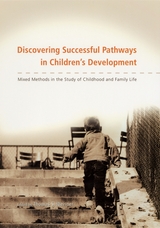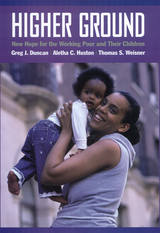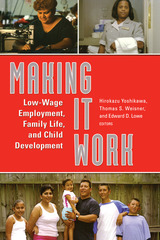3 books by Weisner, Thomas S.

Discovering Successful Pathways in Children's Development
Mixed Methods in the Study of Childhood and Family Life
Edited by Thomas S. Weisner
University of Chicago Press, 2005
Discovering Successful Pathways in Children's Development provides a new perspective on the study of childhood and family life. Successful development is enhanced when communities provide meaningful life pathways that children can seek out and engage. Successful pathways include both a culturally valued direction for development and competence in skills that matter for a child's subsequent success as a person as well as a student, parent, worker, or citizen. To understand successful pathways requires a mix of qualitative, quantitative, and ethnographic methods—the state of the art for research practice among developmentalists, educators, and policymakers alike.
This volume includes new studies of minority and immigrant families, school achievement, culture, race and gender, poverty, identity, and experiments and interventions meant to improve family and child contexts. Discovering Successful Pathways in Children's Development will be of enormous value to everyone interested in the issues of human development, education, and social welfare, and among professionals charged with the task of improving the lives of children in our communities.
This volume includes new studies of minority and immigrant families, school achievement, culture, race and gender, poverty, identity, and experiments and interventions meant to improve family and child contexts. Discovering Successful Pathways in Children's Development will be of enormous value to everyone interested in the issues of human development, education, and social welfare, and among professionals charged with the task of improving the lives of children in our communities.
[more]

Higher Ground
New Hope for the Working Poor and Their Children
Greg J. Duncan
Russell Sage Foundation, 2007
During the 1990s, growing demands to end chronic welfare dependency culminated in the 1996 federal "welfare-to-work" reforms. But regardless of welfare reform, the United States has always been home to a large population of working poor—people who remain poor even when they work and do not receive welfare. In a concentrated effort to address the problems of the working poor, a coalition of community activists and business leaders in Milwaukee, Wisconsin, launched New Hope, an experimental program that boosted employment among the city's poor while reducing poverty and improving children's lives. In Higher Ground, Greg Duncan, Aletha Huston, and Thomas Weisner provide a compelling look at how New Hope can serve as a model for national anti-poverty policies. New Hope was a social contract—not a welfare program—in which participants were required to work a minimum of thirty hours a week in order to be eligible for earnings supplements and health and child care subsidies. All participants had access to career counseling and temporary community service jobs. Drawing on evidence from surveys, public records of employment and earnings, in-depth interviews, and ethnographic observation, Higher Ground tells the story of this ambitious three-year social experiment and evaluates how participants fared relative to a control group. The results were highly encouraging. Poverty rates declined among families that participated in the program. Employment and earnings increased among participants who were not initially working full-time, relative to their counterparts in a control group. For those who had faced just one significant barrier to employment (such as a lack of access to child care or a spotty employment history), these gains lasted years after the program ended. Increased income, combined with New Hope's subsidies for child care and health care, brought marked improvements to the well-being and development of participants' children. Enrollment in child care centers increased, and fewer medical needs went unmet. Children performed better in school and exhibited fewer behavioral problems, and gains were particularly dramatic for boys, who are at the greatest risk for poor academic performance and behavioral disorders. As America takes stock of the successes and shortcomings of the Clinton-era welfare reforms, the authors convincingly demonstrate why New Hope could be a model for state and national policies to assist the working poor. Evidence based and insightfully written, Higher Ground illuminates how policymakers can make work pay for families struggling to escape poverty.
[more]

Making It Work
Low-Wage Employment, Family Life, and Child Development
Hirokazu Yoshikawa
Russell Sage Foundation, 2006
Low-skilled women in the 1990s took widely different paths in trying to support their children. Some held good jobs with growth potential, some cycled in and out of low-paying jobs, some worked part time, and others stayed out of the labor force entirely. Scholars have closely analyzed the economic consequences of these varied trajectories, but little research has focused on the consequences of a mother's career path on her children's development. Making It Work, edited by Hirokazu Yoshikawa, Thomas Weisner, and Edward Lowe, looks past the economic statistics to illustrate how different employment trajectories affect the social and emotional lives of poor women and their children. Making It Work examines Milwaukee's New Hope program, an experiment testing the effectiveness of an anti-poverty initiative that provided health and child care subsidies, wage supplements, and other services to full-time low-wage workers. Employing parent surveys, teacher reports, child assessment measures, ethnographic studies, and state administrative records, Making It Work provides a detailed picture of how a mother's work trajectory affects her, her family, and her children's school performance, social behavior, and expectations for the future. Rashmita Mistry and Edward D. Lowe find that increases in a mother's income were linked to higher school performance in her children. Without large financial worries, mothers gained extra confidence in their ability to parent, which translated into better test scores and higher teacher appraisals for their children. JoAnn Hsueh finds that the children of women with erratic work schedules and non-standard hours—conditions endemic to the low-skilled labor market—exhibited higher levels of anxiety and depression. Conversely, Noemi Enchautegui-de-Jesus, Hirokazu Yoshikawa, and Vonnie McLoyd discover that better job quality predicted lower levels of acting-out and withdrawal among children. Perhaps most surprisingly, Anna Gassman-Pines, Hirokazu Yoshikawa, and Sandra Nay note that as wages for these workers rose, so did their marriage rates, suggesting that those worried about family values should also be concerned with alleviating poverty in America. It is too simplistic to say that parental work is either "good" or "bad" for children. Making It Work gives a nuanced view of how job quality, flexibility, and wages are of the utmost importance for the well-being of low-income parents and children.
[more]
READERS
Browse our collection.
PUBLISHERS
See BiblioVault's publisher services.
STUDENT SERVICES
Files for college accessibility offices.
UChicago Accessibility Resources
home | accessibility | search | about | contact us
BiblioVault ® 2001 - 2024
The University of Chicago Press









